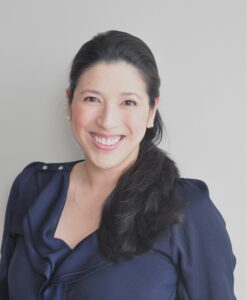Linda Hiraki, MD, ScD, with the Division of Rheumatology, The Hospital for Sick Children (SickKids) in Toronto, has volunteered with the ACR Special Committee on Pediatrics, the Annual Meeting Planning Committee and as co-chair of the ACR/CARRA Mentoring Interest Group for pediatric rheumatologists. Dr. Hiraki tells The Rheumatologist what she plans to do as chair of the Committee on Research (COR), which she’s served as a member of since 2021, and shares what makes ACR committee volunteerism so rewarding.
The Rheumatologist (TR): Could you explain what the COR does?

Dr. Hiraki
Dr. Hiraki: The COR is a joint ACR/ARP committee. The COR encourages basic, clinical and health services research on a range of topics impacting patients with rheumatic diseases. It executes this overarching goal through advocacy, dissemination and interprofessional collaboration. The COR works closely with the Rheumatology Research Foundation to coordinate and align these efforts. COR members are liaisons on other ACR committees, such as the Government Affairs Committee for legislative advocacy and the Annual Meeting Planning Committee. In these many-faceted ways, the COR works to advance research for ACR members and patients with rheumatic diseases.
TR: What prompted your interest in becoming chair of the COR?
Dr. Hiraki: Over the years, I have had the honor of serving on different ACR committees. These experiences provided me opportunities and insights into how committee work may benefit our broader rheumatology community. I joined the COR in 2021 under the leadership of Kristi Kuhn, MD, PhD. As part of the committee, I co-organized the Basic and Clinical Research Conference and helped write the five-year NIH grant supporting the conference. As a clinician-scientist committed to advancing research, I appreciated the broad, multifaceted impact of the COR. The COR chair position is an opportunity to continue and also build on this work with an outstanding group of ACR and ARP members who are dedicated and passionate about advocating for scholarly research for the benefit of our patients.
TR: Could you say a little about the research advocacy components that outgoing chair Dr. Kuhn worked on with the ACR advocacy team, such as getting an arthritis research line item in the Department of Defense (DOD) budget? Why is this work significant?
Dr. Hiraki: Research funding support has become more limited and competitive in recent years, making it imperative for our community to ensure that funds are dedicated to support essential rheumatology research. Dr. Kuhn worked for 10 years to obtain a line item for arthritis research in the DOD budget. Arthritis is the second leading cause of medical discharge from the military (the first being traumatic brain injury). Yet, until this last year, dedicated funding to understand the etiology of arthritis and identify effective treatments was absent. This line item was a huge win for the COR and the Government Affairs Committee. Moving forward, we are actively involved in the 2025–2029 National Institute of Arthritis & Musculoskeletal & Skin Diseases (NIAMS) Strategic Planning process and are exploring ways that we can partner with NIAMS to benefit our membership.
TR: What plans and goals do you have for the Committee on Research over the next year and beyond?
Dr. Hiraki: My goal for the COR in the coming years is to foster global connections to advance and expand the positive impact of rheumatology research. My priority is to continue the successful initiatives from past years, such as the Rheuminations on Research Careers (RoRC) webinar series for early investigators—a great means for continued research mentorship within the ACR. I plan to build upon the COR’s prior successes by fostering global research connections and collaborations, as well as international opportunities for training and mentorship. Historically, the COR has focused on funding advocacy within the U.S. There is an opportunity for global funding advocacy via partnerships with other rheumatology organizations, such as . Today more than ever, we each feel how events around the globe impact us locally and personally. This can be a powerful tool for positive change.
TR: What prompted your interest in rheumatology?
Dr. Hiraki: My interest in rheumatology, and specifically pediatric rheumatology, is personal. My younger sister was diagnosed with lupus at age 12, which had a tremendous impact on our entire family. When I was in medical school, I worked with Earl Silverman, MD, who had been my sister’s pediatric rheumatologist, on a scholarly project. This research experience sparked my passion for research in pediatric rheumatology. Throughout my clinical training in Toronto and research training in Boston, I have been incredibly fortunate to benefit from the knowledge and generous mentorship of leaders in rheumatology research, including Brian Feldman, MD, MSc, Beth Karlson, MD, and Karen Costenbader, MD, MPH. I continue to be inspired by their compassion, diligence and thoughtfulness in how research informs their scholarly care. It’s by their example that I witnessed how research can positively impact the lives of patients like my sister.
TR: Anything else you’d like fellow ACR members to know?
Dr. Hiraki: I encourage ACR members to reach out with ideas and suggestions. As COR chair, I am acting on behalf of members’ interests and want to ensure each voice is heard. Volunteering for ACR committees has been a gratifying experience and an opportunity to positively impact and give back to the community that has helped me immensely in my own research and clinical career.
Vanessa Caceres is a medical writer in Bradenton, Fla.
